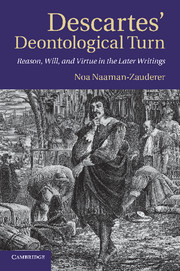Book contents
5 - From intellectual to practical reason
Published online by Cambridge University Press: 10 January 2011
Summary
In recent years, scholars have become increasingly interested in the writings on ethics and human psychology that occupied Descartes in the last years of his life. Contrary to the earlier, traditional view expressing doubts as to whether these writings could at all be regarded as providing a conception of ethics, the perception now generally accepted is that this is a narrow and inadequate view of Descartes' philosophical project. Scholars engaged in the study of Descartes' ethical thinking, however, disagree about its tenets and its relationship with the rest of his philosophy. Relying on the interpretation suggested so far, my main concern in this and the next chapter is to offer a new understanding of the close kinship between Descartes' views on practical and speculative reason, thereby shedding new light on his assertion that intellectual error and moral wrong share the same privative essence – the misuse of free will.
The present chapter traces Descartes' initial steps toward developing his mature conception of practical reason, pointing to the non-consequentialist features of his views. I begin with a preliminary account of Descartes' general attitude toward the discussion of moral issues within his philosophy, then proceed to examine his view of judgments concerning matters of faith in writings from around 1641. Finally, I discuss Descartes' presentation of his early moral outlook in the Third Part of the Discourse on the Method – the morale par provision.
- Type
- Chapter
- Information
- Descartes' Deontological TurnReason, Will, and Virtue in the Later Writings, pp. 149 - 177Publisher: Cambridge University PressPrint publication year: 2010



